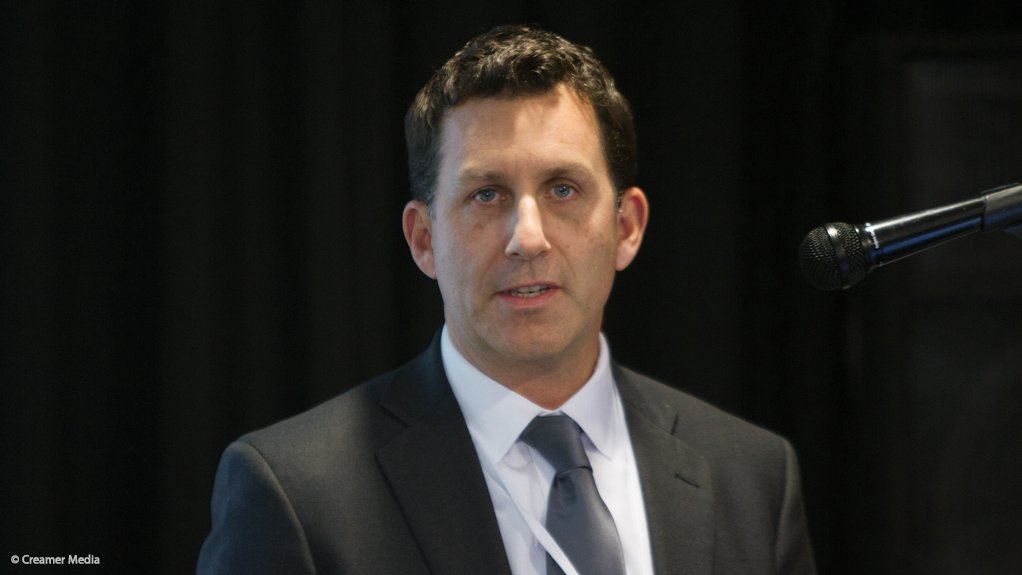Platinum fuel-cell plant being built in Korea by Implats project supplier
JOHANNESBURG (miningweekly.com) – The company that is building South Africa’s first multi-megawatt platinum-catalysed fuel-cell power plant in South Africa is simultaneously building an even larger fuel-cell power plant in Korea under a renewable energy classification.
Doosan Fuel Cell America, which is laying on an eventual 20 MW-plus of fuel-cell power at the Impala Platinum (Implats) refinery in Springs, is also building a 30.8 MW fuel-cell power plant for Korea’s largest power utility.
The Doosan system involved at the Implats refinery requires a minimum of 2.5 kg of platinum per 400 kW system, which equates to about 160 000 oz of new platinum demand for every 1 000 MW of fuel-cell power capacity created.
To date, Doosan Fuel Cell America has deployed more than 110 MW of fuel cells around the world.
Doosan Fuel Cell American VP business development Eric Strayer, who spoke during the fuel-cell panel discussion at the Council for Scientific and Industrial Research (CSIR) conference centre, reports that the Korean government is among a growing number of world governments that are classifying fuel-cell energy as renewable energy.
Korea Hydro and Nuclear Power Company, which provides 40% of Korea’s electricity, is building the fuel cell plant to meet its renewables goals.
Strayer reports that the renewables classification for fuel cells stems from their lower carbon footprint.
He points out that a 400 kW platinum fuel cell provides four times more carbon reduction than a 400 kW solar photovoltaic system, generates six times more energy and occupies 300 times less land.
Land required for a 400 kW fuel cell is tiny compared with land required to do the same in wind and miniscule compared with solar.
He sees the work Doosan is doing in South Africa as “very exciting”.
“It has very high overall efficiency and we’re using platinum, which is what Implats mines and refines. Really a very special application,” he enthuses.
With Phase 2, the Implats power plant will have 50 fuel cells.
“We’re expecting delivery next year and start-up in early 2018,” Strayer reports.
This fuel-cell plant not only provides electricity, but also heat for industrial processes, which makes it an exemplary application.
Doosan scientists and technologists, who used to be focused on closing the technology gaps, are now working on cost reductions.
“We’re approaching top of the pyramid, working on cost down and also product derivatives, trying to expand the market based on running on alternative fuels, creating different outputs for different markets,” Strayer reveals.
In the 1960s, United Technologies Corporation of the US developed fuel cells for the Apollo space mission and since then, fuel cells have been supplied into every manned space mission.
There has never been an incident with those fuel cells and United Technologies went on from there to develop fuel cells of all five major types, embarking on large research into each type of fuel cell so that the company could select the right technology for each application.
Alkaline fuel cells made the most sense in space applications. Proton exchange membrane fuel cells, which contain platinum catalysts, were selected for bus and car transportation applications, and then phosphoric acid fuel cells, another platinum-based fuel cell technology, presented long-life and high-efficiency advantages.
Since Doosan’s acquisition of United Technologies' fuel-cell business in 2014, it has been intensely focused on expanding markets in the 460 kW fuel-cell range, which is ideal for the powering of buildings.
Meanwhile, Implats and its partners are in the last phase of financial close for the introduction of off-grid electricity from the platinum-catalysed fuel-cell system that will make use of natural gas from the Sasol grid.
“We expect to get close and first flow of funds by March, with the system being operational by January 2018,” Impala Refining Services (IRS) fuel cell coordinator Fahmida Smith tells Mining Weekly Online.
For the first 20 years, the fuel-cell power plant will belong to the project’s special project vehicle and thereafter ownership will be transferred to Impala.
The heat-integrated fuel-cell plan has been found to be competitive with the Eskom megaflex tariff over the 20-year over-the-fence power purchasing agreement that the company has clinched.
Smith, who chaired the CSIR discussion on the efficacy of emission-free, environment-friendly, low-maintenance and virtually noiseless fuel cells, had as one of her five panellists Sibanye VP strategic market development Anthea Bath, who expressed great enthusiasm about the Implats project.
“We now have a bankable case. You can hold it up. It’s something real that’s being financed by commercial bankers,” Bath remarked to Mining Weekly Online.
Comments
Press Office
Announcements
What's On
Subscribe to improve your user experience...
Option 1 (equivalent of R125 a month):
Receive a weekly copy of Creamer Media's Engineering News & Mining Weekly magazine
(print copy for those in South Africa and e-magazine for those outside of South Africa)
Receive daily email newsletters
Access to full search results
Access archive of magazine back copies
Access to Projects in Progress
Access to ONE Research Report of your choice in PDF format
Option 2 (equivalent of R375 a month):
All benefits from Option 1
PLUS
Access to Creamer Media's Research Channel Africa for ALL Research Reports, in PDF format, on various industrial and mining sectors
including Electricity; Water; Energy Transition; Hydrogen; Roads, Rail and Ports; Coal; Gold; Platinum; Battery Metals; etc.
Already a subscriber?
Forgotten your password?
Receive weekly copy of Creamer Media's Engineering News & Mining Weekly magazine (print copy for those in South Africa and e-magazine for those outside of South Africa)
➕
Recieve daily email newsletters
➕
Access to full search results
➕
Access archive of magazine back copies
➕
Access to Projects in Progress
➕
Access to ONE Research Report of your choice in PDF format
RESEARCH CHANNEL AFRICA
R4500 (equivalent of R375 a month)
SUBSCRIBEAll benefits from Option 1
➕
Access to Creamer Media's Research Channel Africa for ALL Research Reports on various industrial and mining sectors, in PDF format, including on:
Electricity
➕
Water
➕
Energy Transition
➕
Hydrogen
➕
Roads, Rail and Ports
➕
Coal
➕
Gold
➕
Platinum
➕
Battery Metals
➕
etc.
Receive all benefits from Option 1 or Option 2 delivered to numerous people at your company
➕
Multiple User names and Passwords for simultaneous log-ins
➕
Intranet integration access to all in your organisation





















